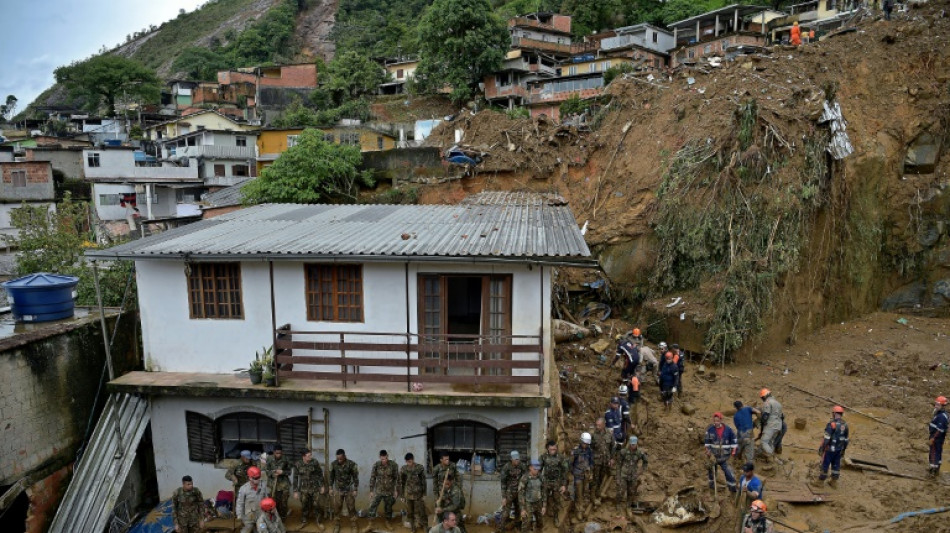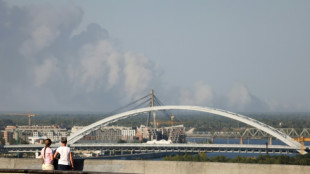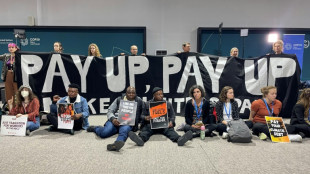

Volunteer logistics whizzes race to aid Brazil storm victims
Clothing donations have flooded into Brazil's disaster zone, but underwear is in short supply. Enter the volunteer logistics masterminds racing to find out what those left homeless by this week's deadly storms actually need -- and get it to them.
Tuesday's torrential rains and the deadly floods and landslides they triggered have turned the scenic mountain city of Petropolis into what numerous officials, including President Jair Bolsonaro, describe as a "war zone."
Teams of rescue workers are knee-deep in mud and rubble searching for landslide victims, anguished families sobbing for their lost loved ones are an all-too-common sight, and the mangled remains of cars washed away in flash floods are strewn around the city.
Residents like lawyer Daniel Vasconcellos have responded by setting up overnight charities resembling wartime supply operations.
When Vasconcellos and his law partner, Bernardo da Silva Oliveira, saw that authorities and established charities were not getting their neighbors the help they needed, they turned their offices into the headquarters of a massive aid effort.
Outside their offices in the hard-hit neighborhood of Chacara Flora, a long human chain passes packages of bottled water from hand to hand at rapid speed.
Inside, the floor is stacked high with clothing, food, hygiene products, diapers and myriad other necessities for people who lost everything.
"When the landslides hit, we and a lot of others rushed to help people trapped in the mud and rubble," says Vasconcellos, 28.
But once rescue workers and the army arrived at the scene, "we saw people needed another kind of help," he told AFP.
Donations started pouring in from all around Brazil as news of the tragedy spread. But he and Oliveira saw a gap between what people were getting and what they needed.
"The official donation centers are full, but sometimes they're not getting to the people up there in hillside neighborhoods who are waiting for a family member's body to be found," says Vasconcellos.
As natives of the neighborhood, they knew what was needed: motorcycles.
In the poor hillside communities around Petropolis -- the scenes of the deadliest landslides -- "there are a lot of places where cars can't go, only a motorcycle can get there," says Oliveira, 29.
"We go all the way to the top of the mountain."
- 'We go to them' -
They started with two motorcycles, using social media to spread the word and collect donations from family and friends.
The operation soon snowballed.
As it grew, they sought to do a better job matching donations to people's needs than groups using official channels.
At first, with their electricity and water cut off, residents' most urgent need was bottled water.
Now, they need to change clothes, their babies' diapers and brush their teeth.
"Sometimes people receive a donation and they end up throwing it away," says Vasconcellos.
"We go to them and say, 'What do you need?' If we don't have it, we go to the supermarket and get it."
The biggest needs right now? Baby bottles, milk and underwear, they say.
Father Moises Fragoso de Sousa is heading another massive logistics operation at the Santo Antonio church, which sits in front of Morro da Oficina, sight of the deadliest landslide.
The square outside the church is an anthill of activity, with about 100 volunteers racing to sort and deliver donations for the community and 200 newly homeless people sheltering inside.
"We started with a very improvised structure, but we're getting better organized by the day," says the 35-year-old priest.
"People's volunteer spirit has been incredible to see. It's the biggest labor force in this tragedy."
T.Salinas--LGdM




